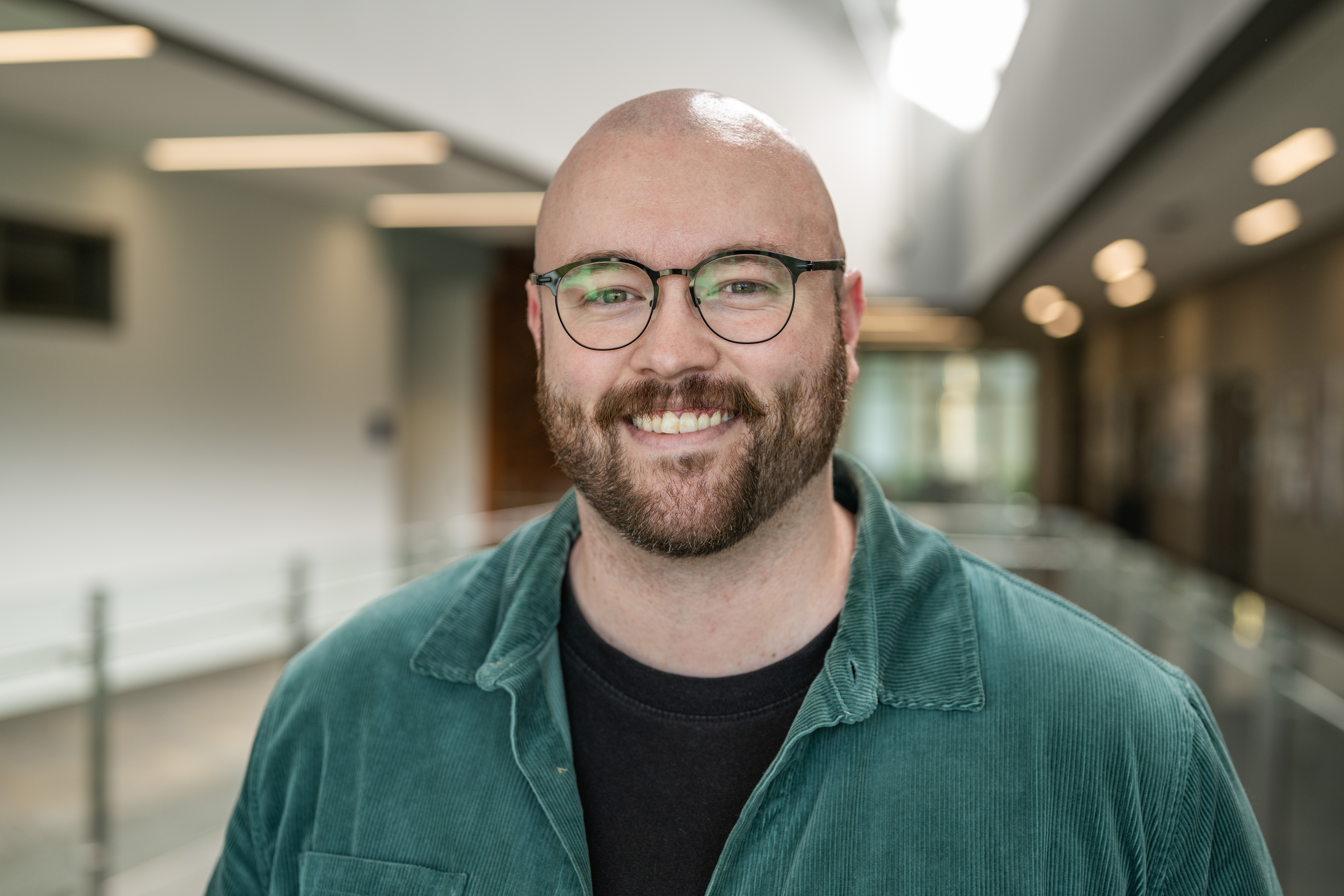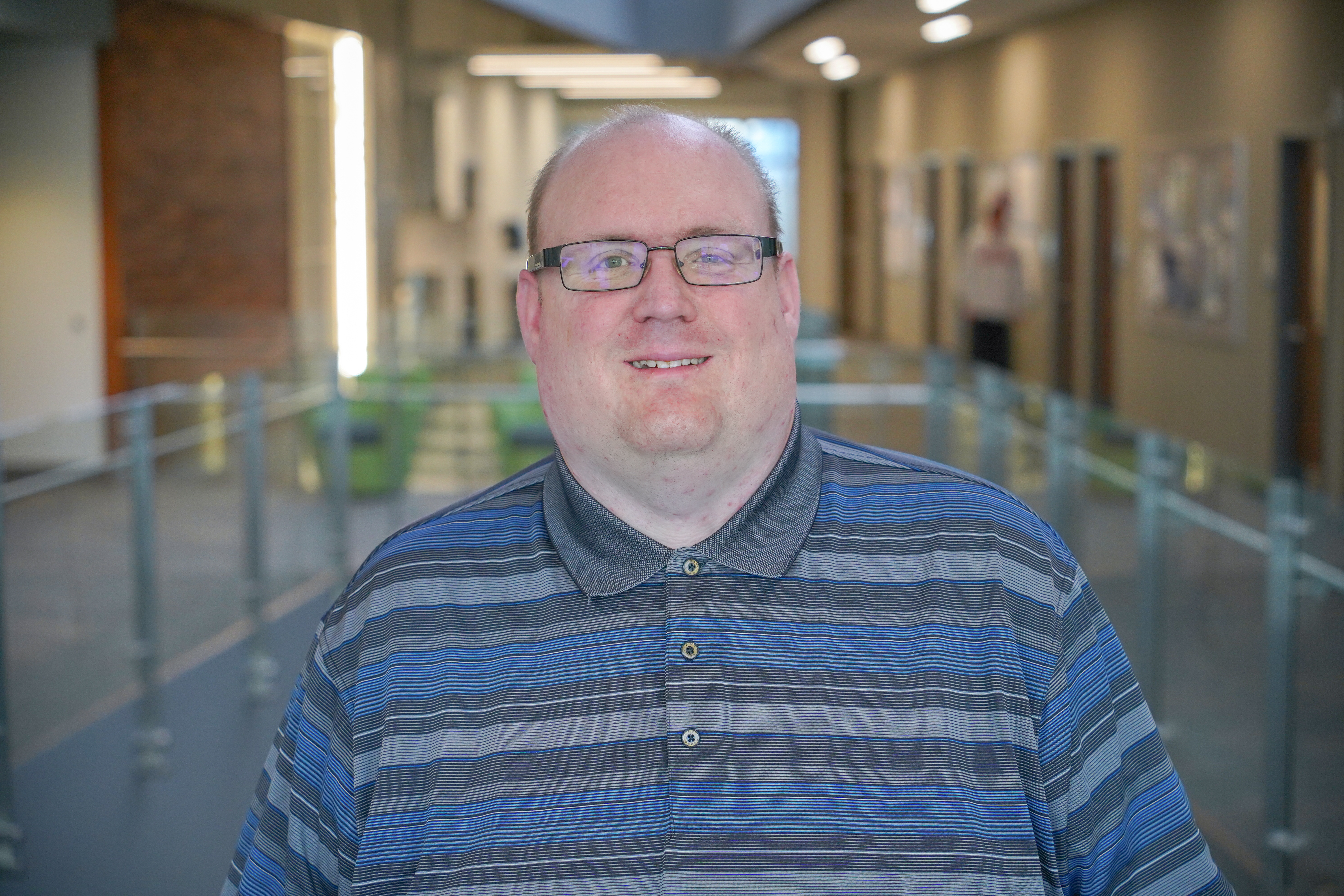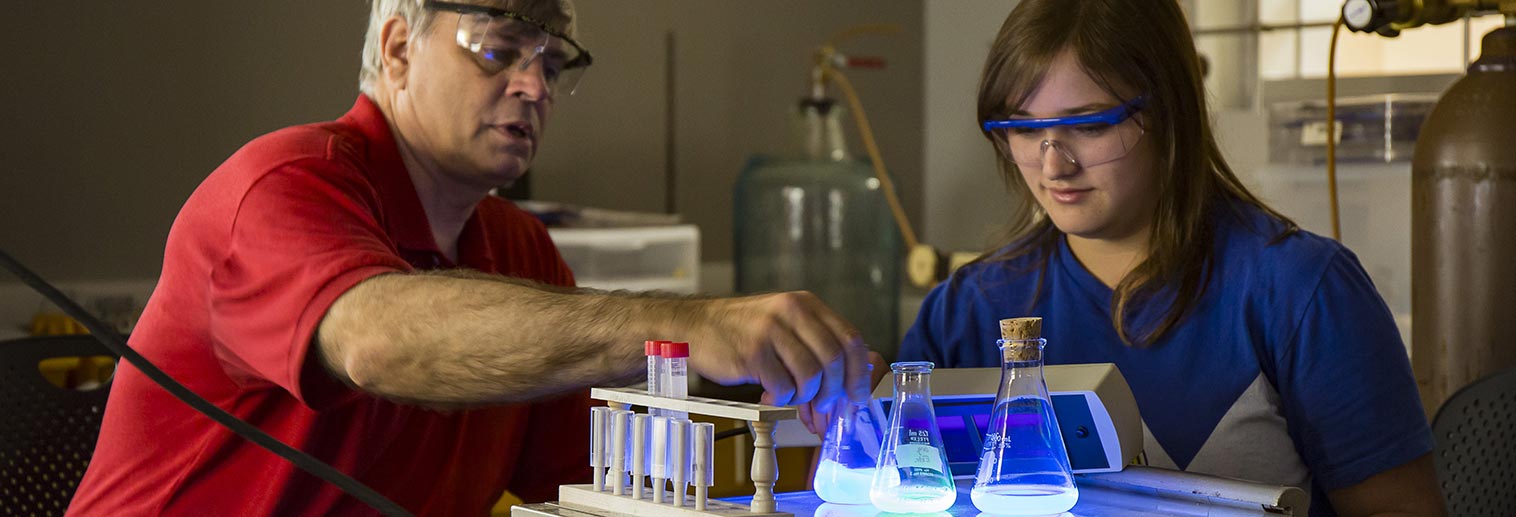Faculty

Shari Uldrich Dunham | Associate Professor, Chemistry
Office location: Collier 222
Office phone: 610-625-7105
Email: sharidunham@moravian.edu
Education
B.A. in Chemistry, Drew University
Ph.D in Chemistry, Massachusetts Institute of Technology
Research Interests
As a biochemistry researcher, I continue to explore the DNA interactions of novel dirhodium compounds with potential anticancer activity. As a educator I am exploring two areas that affect student learning: (1) the impact of guided-inquiry activities on student development of molecular visualization skills in Biochemistry and (2) development of quantitative skill interventions to improve student success in Introductory Chemistry.
Dunham's Selected Publications
Shari U. Dunham, Todd S. Remaley*, Bryn L. Moore*, Debra L. Evans* and Stephen U. Dunham, “Isolation, Characterization, and DNA Binding Kinetics of Three Dirhodium(II,II) Carboxyamidate Complexes: Rh2(µ-L)(HNOCCF3)3 where L= [OOCCH3]-, [OOCCF3]-, [HNOCCF3]-“, Inorganic Chemistry 50(8), pp 3458-3463 (2011).
Shari U. Dunham, Amity E. Burr*, Szymon Mikulski,* Helen Chifotides and Kim Dunbar, “Covalent Binding and Interstrand Cross-Linking of Duplex DNA by Dirhodium(II, II) Carboxylate Compounds”, Biochemistry 44(3), pp 996-1003 (2005).
Mark D. Finke, Shari U. Dunham and Christabel Kwabi*, “Evaluation of four dry commercial gut loading products for improving the calcium content of crickets, Acheta domesticus”, J. of Herp. Medicine and Surgery, 15(1), pp 7-12 (2005).
Mark D. Finke, Shari U. Dunham and John S. Cole III*, “Evaluation of various commercial products for improving the calcium content of crickets, Acheta domesticus”, J. of Herp. Medicine and Surgery, 14(2), pp 6-9 (2004).
Diane Winn, Shari Dunham, and Szymon Mikulski*, “Food for Insects and Insects as Food: Viable Strategies for Achieving Adequate Calcium”, J. of Wildlife Rehabilitation, 26(1), 4-13 (2003).
Daniel S. Pilch, Shari U. Dunham, Elizabeth R. Jamieson, Stephen J. Lippard and Kenneth Breslauer, "DNA sequence context modulates the impact of a cisplatin 1,2-d(GpG) intrastrand cross-link on the conformational and thermodynamic properties of duplex DNA", J. Mol. Bio., 29, 6803-812 (2000).
Shari U. Dunham, Stephen U. Dunham, Christopher J. Turner and Stephen J. Lippard, “Solution structure of a DNA duplex containing a nitroxide spin-labeled platinum d(GpG) intrastrand cross-link refined with NMR-derived long range electron-proton distance restraints”, J. Am. Chem. Soc., 120, 5395-5406 (1998).
Shari U. Dunham and Stephen J. Lippard, “DNA sequence context and protein composition modulate HMG-domain protein recognition of cisplatin-modified DNA”, Biochemistry, 36, 11428-11436 (1997).
Natasa Poklar, Daniel S. Pilch, Stephen J. Lippard, Elizabeth A. Redding, Shari U. Dunham and Kenneth J. Breslauer, “Influence of cisplatin intrastrand crosslinking on the conformation, thermal stability, and energetics of a 20-mer DNA duplex”, Proc. Nat. Acad. Sci., USA, 93, 7606-7611 (1996).

Stephen Dunham | Associate Professor, Chemistry & Department Chair
Office location: Collier 217A
Office phone: 610-625-7103
Email: dunhams2@moravian.edu
Education
B.S., Hamline University
Ph.D. in Chemistry, Montana State
Research Interests
My general area of research is in Bioinorganic chemistry. In particular, I am interested in the synthesis and reactivity of platinum group metals and their interactions with biomolecules. I routinely use nuclear magnetic resonance spectroscopy to characterize these systems.
S. Dunham's Selected Publications
Shari U. Dunham, Todd S. Remaley*, Bryn L. Moore*, Debra L. Evans* and Stephen U. Dunham, “Isolation, Characterization, and DNA Binding Kinetics of Three Dirhodium(II,II) Carboxyamidate Complexes: Rh2(µ-L)(HNOCCF3)3 where L= [OOCCH3]-, [OOCCF3]-, [HNOCCF3]-“, Inorganic Chemistry 50(8), pp 3458-3463 (2011).

Alison Holliday | Associate Professor, Chemistry
Office location: Collier 220
Office phone: 610-861-1433
Email: hollidaya@moravian.edu
Education
B.S.c, Queen's University
Ph.D., Queen's University
Research Interests
The focus of my research is on developing separation methods to investigate complex environmental and biological systems. We use liquid and gas chromatography and capillary electrophoresis to explore peptide folding, the distribution and fate of toxins in the environment, and the chemical defenses of insects.
Holliday's Selected Publications
A.E. Holliday, T.M. Mattingly,*, A.A. Toro*, L.J. Donald, and N.J. Holliday, Age- and sex-related variation in defensive secretions of adult Chlaenius cordicollis and evidence for their role in sexual communication, Chemoecology, 26, 107-119 (2016).
L. Shi, A.E. Holliday, M.S. Glover, M.A. Ewing, D.H. Russell, and D.E. Clemmer, Ion mobility-mass spectrometry reveals the energetics of intermediates that guide polyproline folding, Journal of the American Society for Mass Spectrometry, 27, 22-30 (2016).
John D. Barr, Liuqing Shi, David H. Russell, David E. Clemmer, and Alison E. Holliday, Following a folding transition with capillary electrophoresis and ion mobility spectrometery, Analytical Chemistry, 88, 10933-9 (2016).

Godfred Fianu | Assistant Professor, Chemistry
Office location: Collier 213
Office phone: 610-861-1379
Email: fianug@moravian.edu
Ph.D. Lehigh University
My research interests include Organometallic Chemistry, Physical Organic Chemistry with particular emphasis on titanocene based single-electron catalysis. My prior research was on the mechanistic studies of atom-economical titanocene-catalyzed homolytic aromatic substitution reactions and on titanocene borohydride-catalyzed reductions.
Gansäuer, A.; Richrath, R. B.; Hildebrandt, S.; Olyschläger, T.; Enny, G. D.*; Fianu, G. D.; Flowers, R. A., II. Cp2TiX Complexes for Sustainable Catalysis in Single-Electron Steps. Chem. Eur. J. 2018, 24, 6371-6379.
https://chemistry-europe.onlinelibrary.wiley.com/doi/10.1002/chem.201705707
Fianu, G. D.; Schipper, K. C.*; Flowers, R. A., II. Catalytic carbonyl hydrosilylations via a titanocene borohydride-PMHS reagent system. Catal. Sci. Technol. 2017, 7, 3469-3473.
https://pubs.rsc.org/en/content/articlelanding/2017/cy/c7cy01088e
Gansäuer, A.; Hildebrandt, S.; von Laufenberg, D.; Kube, C.; Dahmen, T.; Michelmann, A.; Fianu, G. D.; Flowers, R. A., II. Cationic Titanocene(III) Complexes for Catalysis in Single-Electron Steps. Angew. Chem., Int. Ed. 2015, 54, 7003-7009.
https://onlinelibrary.wiley.com/doi/full/10.1002/anie.201501955
Gansäuer, A.; von Laufenberg, D.; Kube, C.; Dahmen, T.; Michelmann, A.; Behlendorf, M.; Sure, R.; Seddiqzai, M.; Grimme, S.; Fianu, G. D.; Sadasivam, D. V.; Flowers, R. A., II. Mechanistic Study of the Titanocene(III)-Catalyzed Radical Arylation of Epoxides. Chem. Eur. J. 2015, 21, 280-289.
https://chemistry-europe.onlinelibrary.wiley.com/doi/full/10.1002/chem.201404404
Gansäuer, A.; Kube, C.; Daasbjerg, K.; Sure, R.; Grimme, S.; Fianu, G. D.; Sadasivam, D. V.; Flowers, R. A., II. Substituent Effects and Supramolecular Interactions of Titanocene(III) Chloride: Implications for Catalysis in Single-Electron Steps. J. Am. Chem. Soc. 2014, 136, 1663-1671.
https://pubs.acs.org/doi/10.1021/ja4121567

Joseph Meadows | Assistant Professor, Chemistry
Office location: Collier 217C
Office phone: 610-625-7294
Email: meadowsj@moravian.edu
Education
B.S., East Texas Baptist University
M.S., University fo Michigan
Ph.D., University of Michigan
Research Interests
My research is broadly centered on Physical Inorganic Chemistry, specifically with respect to the synthesis, spectroscopy, and computational modeling of transition metal carbonyl complexes. My group focuses on the use of infrared and NMR spectroscopies alongside quantum mechanical simulations to explore the structural and energetic properties of catalytic intermediates.
Meadow's Selected Publications
R.J. Sension, T.P. McClain, L.B. Michocki, N.A. Miller, R. Alonso-Mori, F.A. Lima, F. Ardana-Lamas, M. Biednov, T. Chung, A. Deb, Y. Jiang, A.K. Kaneshiro, D. Khakhulin, K.J. Kubarych, R.M. Lamb, J.H. Meadows, F. Otte, D.L. Sofferman, S. Song, Y. Uemura, T.B. van Driel, J.E. Penner-Hahn.Structural Evolution of Photoexcited Methylcobalamin toward CarH-like Metastable State: Evidence from Time-Resolved X-ray Absorption and X-ray Emission, J Phys. Chem. B 2024, 128, 34, 8131–8144
N.A. Miller, A.K. Kaneshiro, A. Konar, R. Alonso-Mori, A. Britz, A. Deb, J.M. Glownia, J.D. Koralek, L. Mallik, J.H. Meadows, L.B. Michocki, T.B. van Driel, M. Koutmos, S. Padmanabhan, M. Elías-Arnanz, K.J. Kubarych, E.N.G. Marsh, J.E. Penner-Hahn, and R.J. Sension. The Photoactive Excited State of the B12-Based Photoreceptor CarH. J Phys. Chem. B 2020, 124, 47, 10732-10738.
N.A. Miller, L.B. Michocki, R. Alonso-Mori, A. Britz, A. Deb, D.P. DePonte, J.M. Glownia, A.K. Kaneshiro, C. Kieninger, J. Koralek, J.H. Meadows, T. B. van Driel, B. Kräutler, K.J. Kubarych, J.E. Penner-Hahn, and R.J. Sension. Antivitamins B12 in a Microdrop: The Excited-State Structure of a Precious Sample Using Transient Polarized X-ray Absorption Near-Edge Structure. J Phys. Chem. Lett. 2019, 10, 18, 5484-5489.
Katrina Brandmier | Assistant Professor of Practice, Chemistry
Office location: Collier 217B
Office phone: 610-625-7825
Email: brandmierk@moravian.edu
My research is focused on the topological and structural analysis of membrane proteins through the use of various biophysical techniques. This work uses fluorescence spectroscopy, circular dichroism, analytical ultracentrifugation, and light scattering techniques to reveal oligometric states of proteins, characterize conformational changes, and reveal structural insights. This information then provides insights into developing therapeutic strategies targeting protein misfolding, aggregations and disease-related dysfunction.
Brandmier's Selected Publications
Brandmier, K.M.; Park, S.; Im, W.' Glover, K.J. Interhelical Distance Measurements of Support a Hirpin Conformation for Caveolin-1 in Phospholipid Bicelles. bioRxiv, 2025, DOI 10.1101/2025.07.08.663041
Brandmier, K.M.; Glover, K.J. Proline 110 is Necessary for Maintaining Compact Helical Arrangement in Caveolin-1. bioRxiv, 2025, DOI 10.1101/2025.07.10.664188
Julien, J.A.; Fernandez, M.G.; Brandmier, K.M.; Del Mundo, J.T.; Bator, C.M.; Loftus, L.A.; Gomez, E.W.; E.D.; Glover, K.J. Rapid Preparation of Nanodiscs for Biophysical Studies. Archives of Biochemistry and Biophysics 2021, 712, 109051.

William J. Farina, Jr. | Laboratory Coordinator and Instructor
Office location: Collier 212
Office phone: 610-861-1372
Email: farinaw@moravian.edu
M.Ed. Lock Haven University of Pennsylvania
Ph.D. Lehigh University
Pennsylvania State Department of Education Secondary Instruction: Chemistry 7-12
California Commission on Teacher Credentialing Instruction Grades 12 and below
My research interests include the design and research of web-based learning tools and environments for chemistry instruction; learning through the use of both structured and self-paced learning tools; design and implementation of online science curricula, web-based instructional technologies and the design and use of instructional technologies to promote learning.
Farina's Selected Publications
Bodzin, A., Hammond, T., Fu, Q. and Farina, W. (2020). Development of instruments to assess students’ spatial learning attitudes (SLA) and interest in science, technology and geospatial technology (STEM-GEO). International Journal of Educational Methodology, 6(1), 67-81. DOI: 10.12973/ijem.6.1.67. Invited paper.
Carrigan, J., Bodzin, A. M., Hammond, T. C., Rutzmoser, S., Popejoy, K., Farina, W., Hanson, I. Salter, S., Anastasio, D., Kangas, S., Holland, B. and Sahagian, D. (2019). Investigating urban trees. Exploring the impact of trees around our school with geospatial technologies. The Science Teacher, 86(8), 27-35.
Hammond, T.C., Bodzin, A., Anastasio, D., Holland, B., Popejoy, K., Sahagian, D., Rutzmoser, S., Carrigan, J., & Farina, W. (2018). “You know you can do this, right?”: Developing geospatial technological pedagogical content knowledge (GS-TPACK) and enhancing teachers’ cartographic behaviors with Socio-Environmental Science Investigations (SESI). Cartography and Geographic Information Science, 45(4), 305-318.
Farina, W., and Bodzin, A.M. (2018). The effectiveness of an asynchronous online module on university students’ understanding of the Bohr Model of the hydrogen atom. Journal of Science Education and Technology, 27(3), 256-269. DOI: 10.1007/s10956-017-9722-0
Carl Salter | Professor Emeritus, Chemistry
Office location: Collier 221
Office phone: 610-625-7920
Email: salterc@moravian.edu
Website: http://home.moravian.edu/publi
Education
M.S. in Chemistry, Vanderbilt University
Ph.D. in Chemistry, Vanderbilt University
Research Interests
Spectroscopy, electronic structure calculations, and statistical analysis of experimental data.

